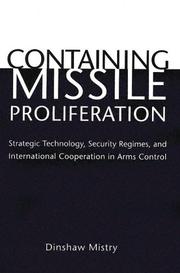| Listing 1 - 4 of 4 |
Sort by
|
Book
ISBN: 9781107073418 9781139683487 Year: 2014 Publisher: Cambridge [etc.] Cambridge University Press
Abstract | Keywords | Export | Availability | Bookmark
 Loading...
Loading...Choose an application
- Reference Manager
- EndNote
- RefWorks (Direct export to RefWorks)
Polemology --- Internal politics --- United States --- India --- Nuclear nonproliferation --- Government policy --- Foreign relations --- United States of America

ISBN: 0295802529 9780295802527 9780295985077 0295985070 0295982942 9780295982946 Year: 2003 Publisher: Seattle : University of Washington Press,
Abstract | Keywords | Export | Availability | Bookmark
 Loading...
Loading...Choose an application
- Reference Manager
- EndNote
- RefWorks (Direct export to RefWorks)
The proliferation of ballistic missiles that can deliver weapons of mass destruction halfway across the world is a matter of growing urgency and concern, as is the fate of agreements limiting the development of such deadly weapons. The Bush administration’s scrapping of the ABM Treaty and pursuit of a huge National Missile Defense initiative are dramatic evidence of this concern. Yet there remains much uncertainty about the viability of missile defense. If defenses fall short, strong security regimes will be necessary to contain missile proliferation.Since 1987, more than thirty states have agreed to restrict their transfer of missiles and related technologies under the Missile Technology Control Regime (MTCR). During the MTCR’s first decade, several regional powers were thwarted from advancing their missile ambitions. Subsequently, however, states such as North Korea, Iran, Pakistan, India, and Israel have tested medium-range missiles and others have expanded their missile arsenals.Dinshaw Mistry critically examines the successes and limitations of the MTCR, and suggests five practical ways to strengthen the regime. The author’s exhaustive research offers new and detailed insights on the technology and politics of missile programs in Iran, Iraq, North Korea, Pakistan, India, Israel, Egypt, South Korea, Taiwan, and other countries. Mistry also shows how international cooperation, security regimes, and U.S. foreign policies of engagement and containment with these states can halt their missile programs.Mistry’s book is the first comprehensive study of the MTCR and of international efforts to contain missile proliferation. Policymakers, scholars, and the general reader will find this book a valuable contribution to the subjects of arms control, ballistic missile proliferation, multilateral cooperation, and international security regimes.For the author's update, go to http://www.washington.edu/uwpress/books/UpdateApril2009.pdf
Ballistic missiles. --- Arms control. --- Missiles, Ballistic --- Guided missiles --- Rockets (Aeronautics) --- Security, International --- Arms race --- Disarmament --- Military readiness
Book
ISBN: 1316143902 1316143929 1316143945 1139683489 1316144003 131614402X 1316143961 1107073413 1322067260 9781316143964 9781139683487 9781316144008 9781107073418 Year: 2014 Publisher: Cambridge : Cambridge University Press,
Abstract | Keywords | Export | Availability | Bookmark
 Loading...
Loading...Choose an application
- Reference Manager
- EndNote
- RefWorks (Direct export to RefWorks)
From 2005 to 2008, the United States and India negotiated a pathbreaking nuclear agreement that recognised India's nuclear status and lifted longstanding embargoes on civilian nuclear cooperation with India. This book offers the most comprehensive account of the diplomacy and domestic politics behind this nuclear agreement. Domestic politics considerably impeded - and may have entirely prevented - US nuclear accommodation with India; when domestic obstacles were overcome, US-India negotiations advanced; and even after negotiations advanced, domestic factors placed conditions on and affected the scope of US-India nuclear cooperation. Such a study provides new insights into this major event in international politics, and it offers a valuable framework for analysing additional US strategic and nuclear dialogues with India and with other countries.
Nuclear nonproliferation --- Export of nuclear materials --- Export of nuclear technology --- International control of nuclear energy --- Nonproliferation, Nuclear --- Nuclear energy --- Nuclear exports --- Nuclear proliferation --- Proliferation, Nuclear --- Nuclear arms control --- Nuclear-weapon-free zones --- Government policy --- International control --- India. --- United States. --- United States --- India --- Foreign relations --- Agreement for Cooperation between the Government of India and the Government of the United States of America Concerning Peaceful Uses of Nuclear Energy
Multi

ISBN: 9781626373631 Year: 2022 Publisher: Boulder Lynne Rienner Publishers
Abstract | Keywords | Export | Availability | Bookmark
 Loading...
Loading...Choose an application
- Reference Manager
- EndNote
- RefWorks (Direct export to RefWorks)
| Listing 1 - 4 of 4 |
Sort by
|

 Search
Search Feedback
Feedback About UniCat
About UniCat  Help
Help News
News